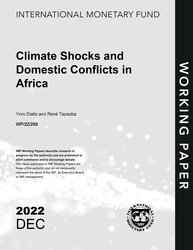
Climate Shocks and Domestic Conflicts in Africa
Climate Shocks and Domestic Conflicts in Africa
READ MORE...
Volume/Issue:
Volume 2022
Issue 250
Publication date: December 2022
ISBN: 9798400228056
$0.00
Add to Cart by clicking price of the language and format you'd like to purchase
Available Languages and Formats
| English |
Topics covered in this book
This title contains information about the following subjects.
Click on a subject if you would like to see other titles with the same subjects.
Economics- Macroeconomics , Economics / General , Environmental Economics , Natural Disasters , Natural Resources , Demography , Weather shocks , Domestic conflicts , Demographics , Resilience , weather shock indicator , database weather shock , weather shock , baseline result , policy resilience , Natural disasters , Climate change , Natural resources , Africa , Global
Summary
This paper analyzes the interlinkages between climate shocks, domestic conflicts, and policy resilience in Africa. It builds on a Correlated Random Effect model to asess these interrelationships on a broad sample of 51 African countries over the 1990-2018 period. We find suggestive evidence that climate shocks, as captured through weather shocks, increase the likelihood of domestic conflicts, by as high as up to 38 percent. However, the effect holds only for intercommunal conflicts, not for government-involved conflicts. The effect is maginified in countries with more unequal income distribution and a stronger share of young male demographics. The results are robust to a wide set of sensitivity checks, including using various indicators of weather shocks and domestic conflicts, and alternative estimation techniques. The findings shed light on key policy resilience factors, including steadily improving domestic revenue mobilization, strengthening social protection and access to basic health care services, scaling up public investment in the agriculture sector, and stepping up anti-desertification efforts.
Copyright © 2010 - 2026
Powered by:
AIDC



